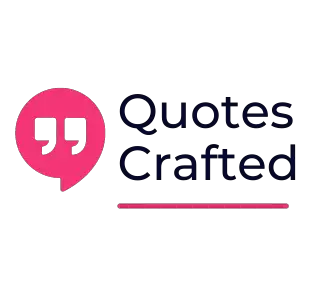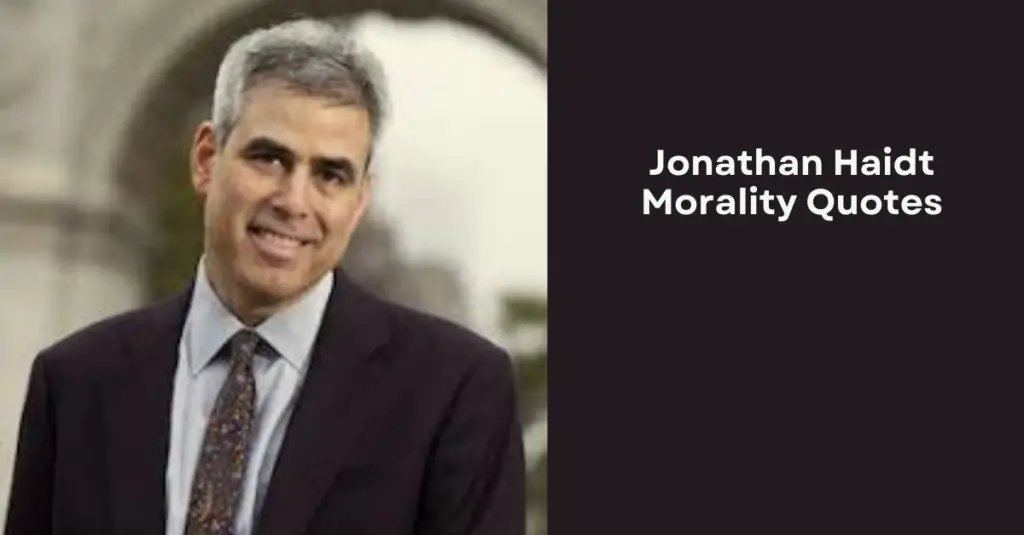Hey there, thinkers and curious minds! If you’ve ever wondered why people act the way they do, you’ve probably come across Jonathan Haidt Morality Quotes. These gems dive deep into the human psyche, exploring what drives our decisions, beliefs, and values. Whether you’re a psychology enthusiast or just love a good thought-provoking quote, Haidt’s words are like a flashlight in the fog of human behavior. Let’s explore some of his most powerful ideas!
One of Haidt’s most talked-about topics is the Jonathan Haidt quotes Anxious Generation. He sheds light on why younger generations feel more stressed and disconnected. His insights are eye-opening and, honestly, a little scary. But they’re also a call to action for better mental health and community building.
Then there’s his take on Jonathan Haidt quotes about social media. Spoiler alert: it’s not all sunshine and rainbows. Haidt explains how platforms shape our minds, relationships, and even our morals. If you’ve ever felt overwhelmed by the digital world, his words will hit home.
If you’re hungry for more, check out Jonathan Haidt books. Titles like The Righteous Mind and The Happiness Hypothesis are must-reads. They’re packed with research, stories, and wisdom that’ll make you see the world differently.
For book lovers, Jonathan Haidt Goodreads is a treasure trove. Reviews, discussions, and recommendations—it’s the perfect place to dive deeper into his work. You might even find your next favorite read!
And let’s not forget the Jonathan Haidt commute. Yes, even his thoughts on daily travel are fascinating. He talks about how small changes in our routines can impact our happiness and productivity. Who knew your morning drive could be so meaningful?
So, whether you’re exploring morality, mental health, or the impact of technology, Jonathan Haidt Morality Quotes are your guide. Ready to rethink everything? Let’s go!
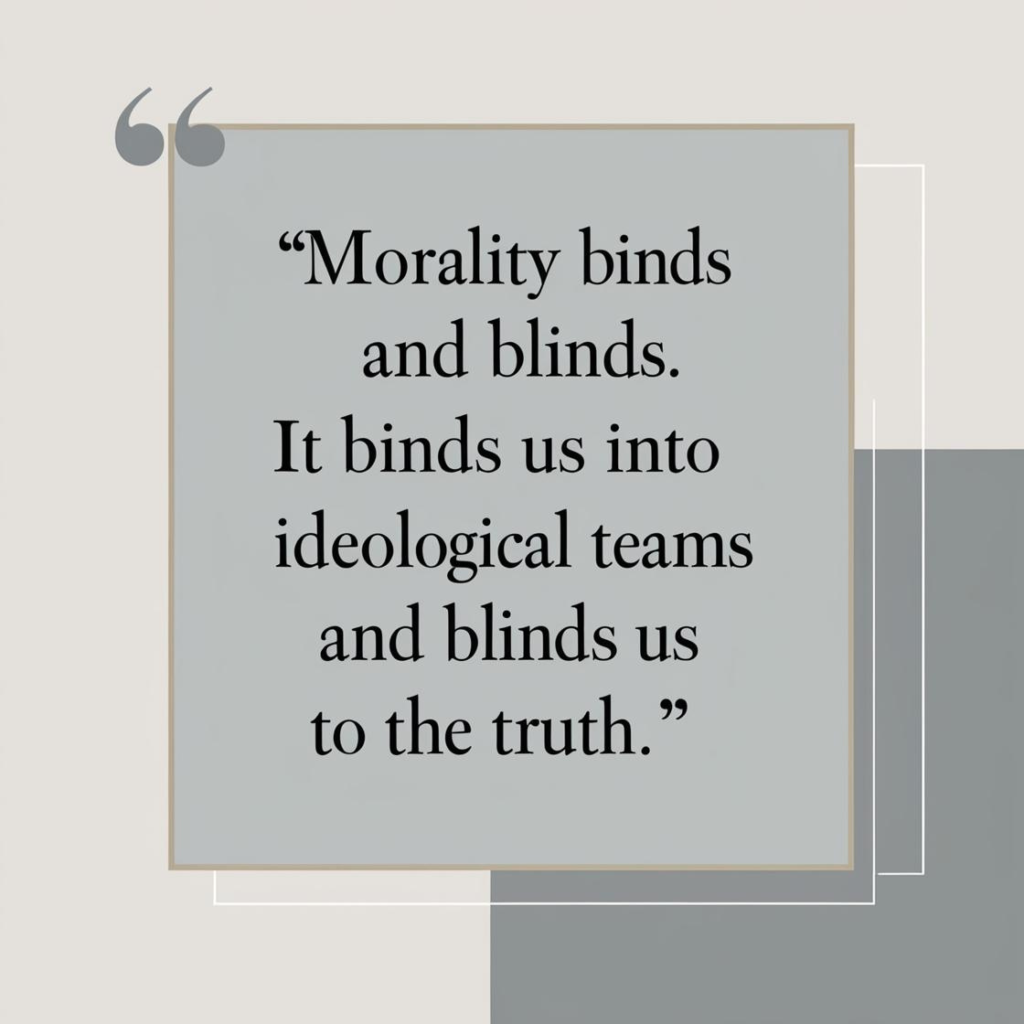
The Role of Morality in Modern Society
- “Morality binds and blinds. It binds us into ideological teams and blinds us to the truth.”
This quote highlights how Jonathan Haidt Morality Quotes morality can both unite and divide us, a theme explored in his works. - “We are deeply intuitive creatures with gut feelings that drive our moral judgments.”
This idea explains how our instincts shape our perceptions, even in the digital age. - “Moral systems are interlocking sets of values and practices that suppress selfishness.”
This reflects on the role of morality in fostering cooperation and community. - “The human mind is a story processor, not a logic processor.”
This emphasizes the power of narratives in shaping our moral beliefs. - “Moral reasoning is often just a post-hoc justification for our gut feelings.”
This challenges the idea that morality is purely rational. - “We are 90% chimp and 10% bee, capable of both selfishness and selflessness.”
This explores the duality of human nature in the context of online behavior. - “Moral communities are fragile things, hard to build and easy to destroy.”
This underscores the importance of nurturing trust and cooperation in society. - “The righteous mind is like a tongue with six taste receptors.”
This explains his metaphor for the foundations of morality. - “Moral psychology can help us understand why we are so divided.”
This offers hope for bridging ideological divides through empathy and understanding. - “We are all self-righteous hypocrites, blind to our own biases.”
This reflects on how online platforms amplify our moral blind spots. - “Morality is not just about fairness; it’s also about loyalty, authority, and sanctity.”
This expands our understanding of what morality encompasses. - “The human mind is designed to unite us into teams, divide us against other teams, and blind us to the truth.”
This explores the tribal nature of human psychology. - “Moral systems are like immune systems, protecting groups from threats.”
This uses a powerful metaphor to explain the function of morality in society. - “We are all trapped in a moral matrix, unable to see beyond our own values.”
This highlights how digital echo chambers reinforce our moral frameworks. - “Moral psychology is the key to understanding human flourishing.”
This emphasizes the importance of morality in achieving a thriving society.
The Impact of Social Media on Society
- “Social media has turned society into a giant moral outrage machine.”
This reflects on how online platforms amplify anger and division. - “The internet is the first thing that humanity has built that humanity doesn’t understand.”
This highlights the unintended consequences of digital technology. - “Social media rewards outrage, and outrage destroys trust.”
This explains how online behavior erodes social cohesion. - “The internet is like a city without a police force, where mobs rule.”
This uses a vivid metaphor to describe the chaos of online spaces. - “Social media has made it easier to hate people we’ve never met.”
This reflects on the dehumanizing effects of digital interactions. - “The internet has created a world where everyone is a critic and no one is a listener.”
This highlights the lack of empathy in online discourse. - “Social media has turned us into performers, constantly seeking validation.”
This explores the psychological pressures of online life. - “The internet has made it easier to spread lies than truths.”
This reflects on the challenges of misinformation in the digital age. - “Social media has created a generation that is anxious, fragile, and disconnected.”
This ties into his work on the challenges facing young people today. - “The internet has turned us into a society of perpetual outrage.”
This critiques the culture of constant anger online. - “Social media has made it harder to have meaningful conversations.”
This reflects on the superficiality of digital communication. - “The internet has created a world where everyone is shouting and no one is listening.”
This highlights the lack of dialogue in online spaces. - “Social media has turned us into a society of perpetual performance.”
This explores the pressures of maintaining an online persona. - “The internet has made it easier to find people who agree with us and harder to understand those who don’t.”
This reflects on the echo chamber effect.
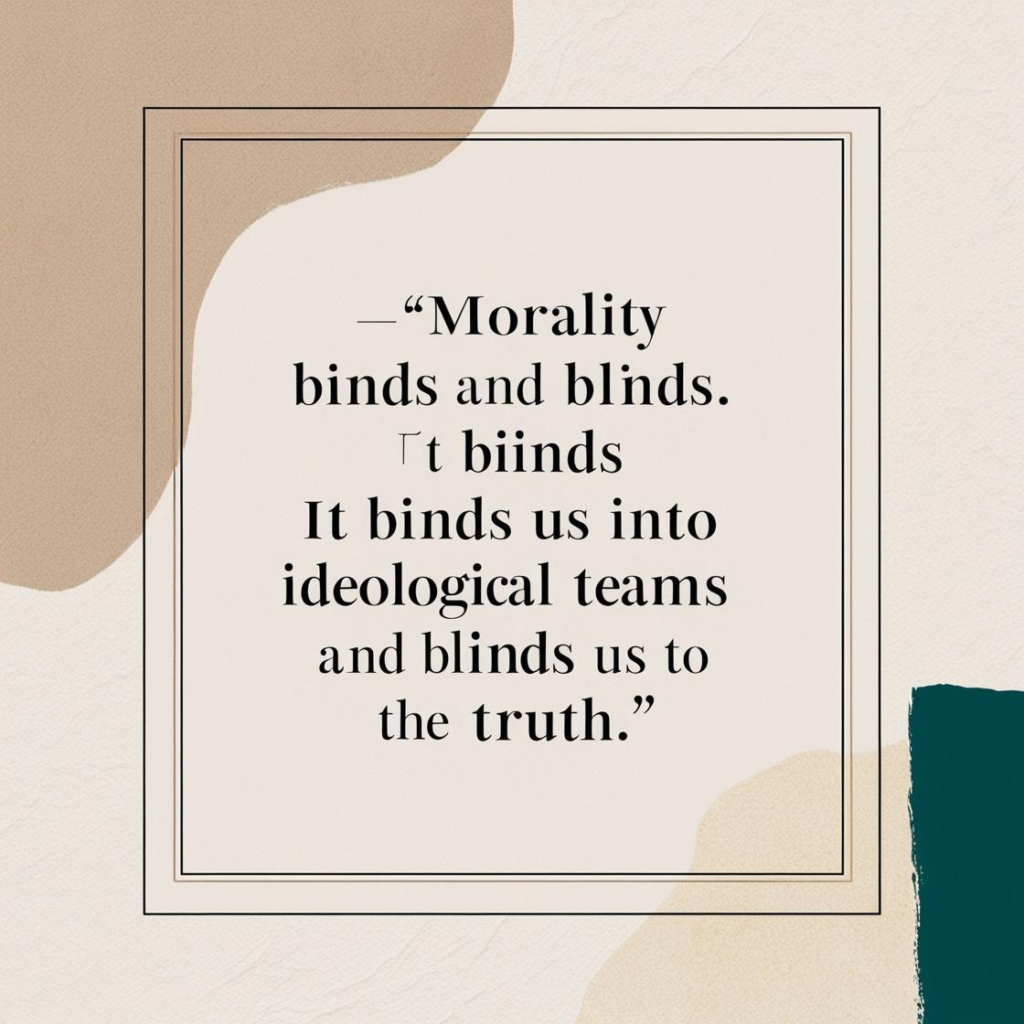
The Role of Morality in Modern Society
- “Morality binds and blinds. It binds us into ideological teams and blinds us to the truth.”
This Jonathan Haidt morality quote highlights how morality can both unite and divide us, a theme explored in his books like The Righteous Mind. - “We are deeply intuitive creatures with gut feelings that drive our moral judgments.”
A Jonathan Haidt quote about social media that explains how our instincts shape our perceptions, even in the digital age. - “Moral systems are interlocking sets of values and practices that suppress selfishness.”
This Jonathan Haidt morality quote reflects on the role of morality in fostering cooperation and community. - “The human mind is a story processor, not a logic processor.”
A Jonathan Haidt quote from Goodreads that emphasizes the power of narratives in shaping our moral beliefs. - “Moral reasoning is often just a post-hoc justification for our gut feelings.”
This Jonathan Haidt morality quote challenges the idea that morality is purely rational. - “We are 90% chimp and 10% bee, capable of both selfishness and selflessness.”
A Jonathan Haidt quote about social media that explores the duality of human nature in the context of online behavior. - “Moral communities are fragile things, hard to build and easy to destroy.”
This Jonathan Haidt morality quote underscores the importance of nurturing trust and cooperation in society. - “The righteous mind is like a tongue with six taste receptors.”
A Jonathan Haidt quote from Goodreads that explains his metaphor for the foundations of morality. - “Moral psychology can help us understand why we are so divided.”
This Jonathan Haidt morality quote offers hope for bridging ideological divides through empathy and understanding. - “We are all self-righteous hypocrites, blind to our own biases.”
A Jonathan Haidt quote about social media that reflects on how online platforms amplify our moral blind spots. - “Morality is not just about fairness; it’s also about loyalty, authority, and sanctity.”
This Jonathan Haidt morality quote expands our understanding of what morality encompasses. - “The human mind is designed to unite us into teams, divide us against other teams, and blind us to the truth.”
A Jonathan Haidt quote from Goodreads that explores the tribal nature of human psychology. - “Moral systems are like immune systems, protecting groups from threats.”
This Jonathan Haidt morality quote uses a powerful metaphor to explain the function of morality in society. - “We are all trapped in a moral matrix, unable to see beyond our own values.”
A Jonathan Haidt quote about social media that highlights how digital echo chambers reinforce our moral frameworks. - “Moral psychology is the key to understanding human flourishing.”
This Jonathan Haidt morality quote emphasizes the importance of morality in achieving a thriving society.
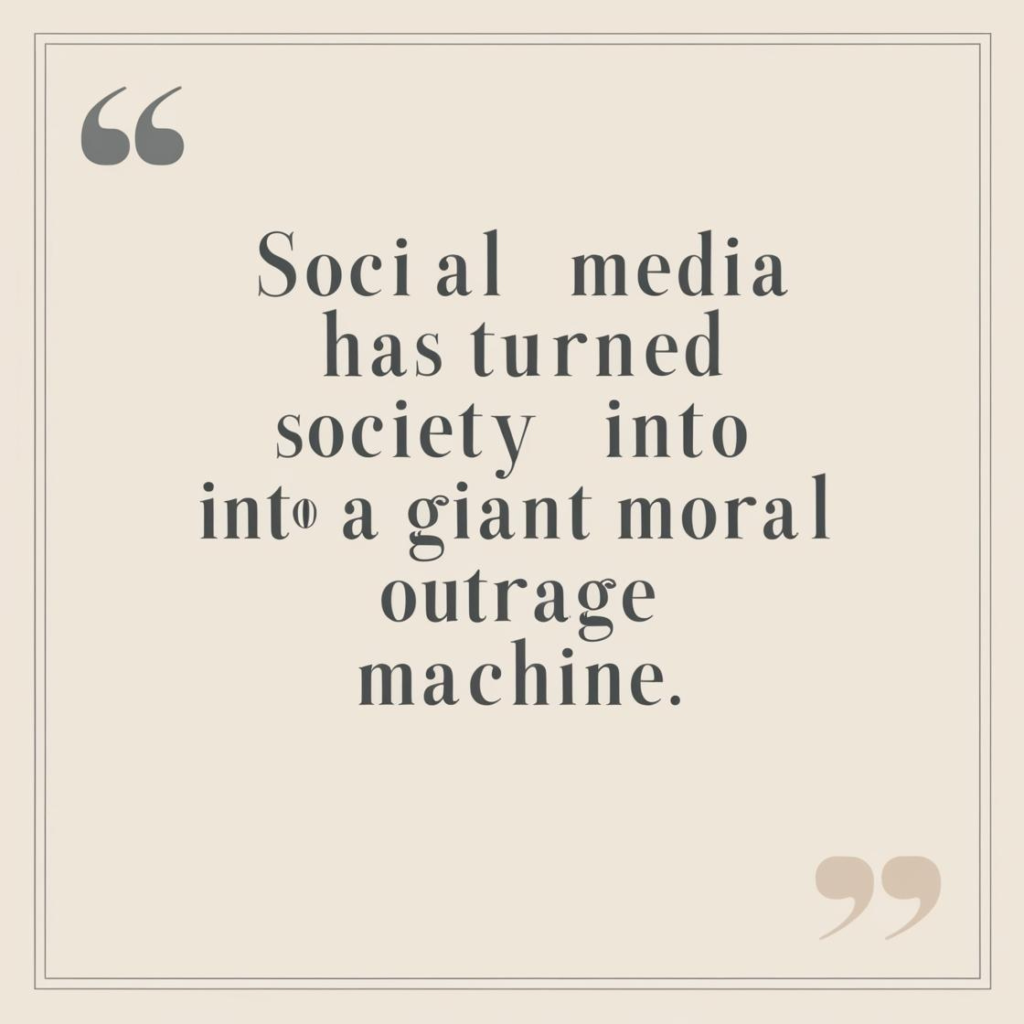
The Impact of Social Media on Morality
- “Social media has turned society into a giant moral outrage machine.”
This Jonathan Haidt quote about social media reflects on how online platforms amplify anger and division. - “The internet is the first thing that humanity has built that humanity doesn’t understand.”
A Jonathan Haidt quote from Goodreads that highlights the unintended consequences of digital technology. - “Social media rewards outrage, and outrage destroys trust.”
This Jonathan Haidt quote about social media explains how online behavior erodes social cohesion. - “The internet is like a city without a police force, where mobs rule.”
A Jonathan Haidt quote from Goodreads that uses a vivid metaphor to describe the chaos of online spaces. - “Social media has made it easier to hate people we’ve never met.”
This Jonathan Haidt quote about social media reflects on the dehumanizing effects of digital interactions. - “The internet has created a world where everyone is a critic and no one is a listener.”
A Jonathan Haidt quote from Goodreads that highlights the lack of empathy in online discourse. - “Social media has turned us into performers, constantly seeking validation.”
This Jonathan Haidt quote about social media explores the psychological pressures of online life. - “The internet has made it easier to spread lies than truths.”
A Jonathan Haidt quote from Goodreads that reflects on the challenges of misinformation in the digital age. - “Social media has created a generation that is anxious, fragile, and disconnected.”
This Jonathan Haidt quote about social media ties into his work on the Anxious Generation. - “The internet has turned us into a society of perpetual outrage.”
A Jonathan Haidt quote from Goodreads that critiques the culture of constant anger online. - “Social media has made it harder to have meaningful conversations.”
This Jonathan Haidt quote about social media reflects on the superficiality of digital communication. - “The internet has created a world where everyone is shouting and no one is listening.”
A Jonathan Haidt quote from Goodreads that highlights the lack of dialogue in online spaces. - “Social media has turned us into a society of perpetual performance.”
This Jonathan Haidt quote about social media explores the pressures of maintaining an online persona. - “The internet has made it easier to find people who agree with us and harder to understand those who don’t.”
A Jonathan Haidt quote from Goodreads that reflects on the echo chamber effect. - “Social media has created a world where outrage is the norm and empathy is rare.”
This Jonathan Haidt quote about social media critiques the emotional toll of online interactions.
